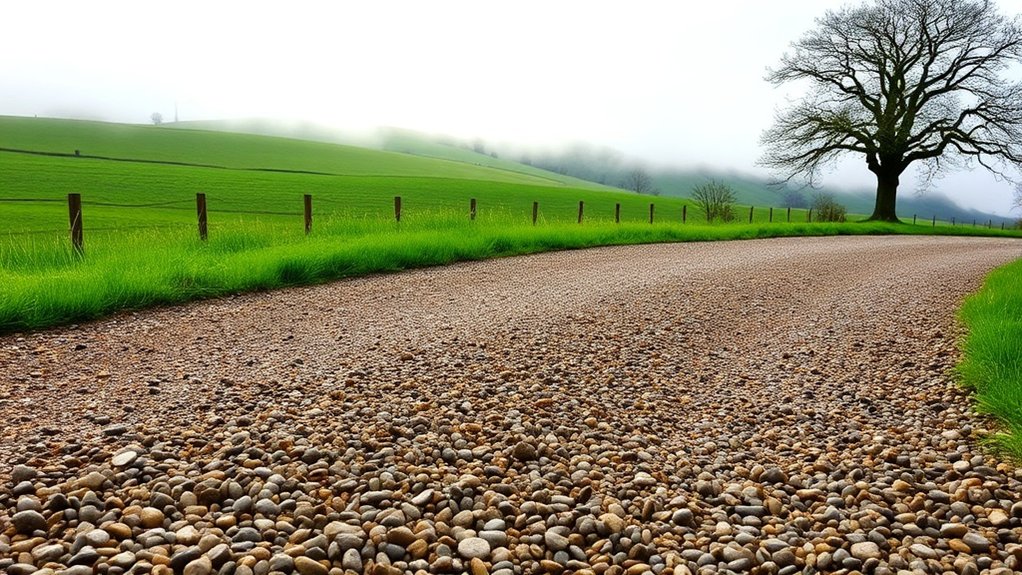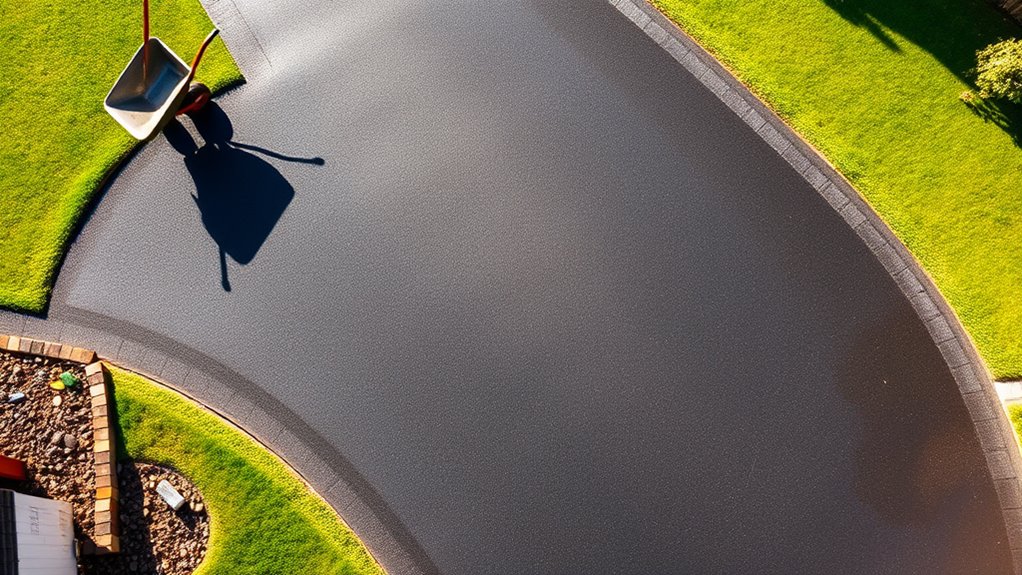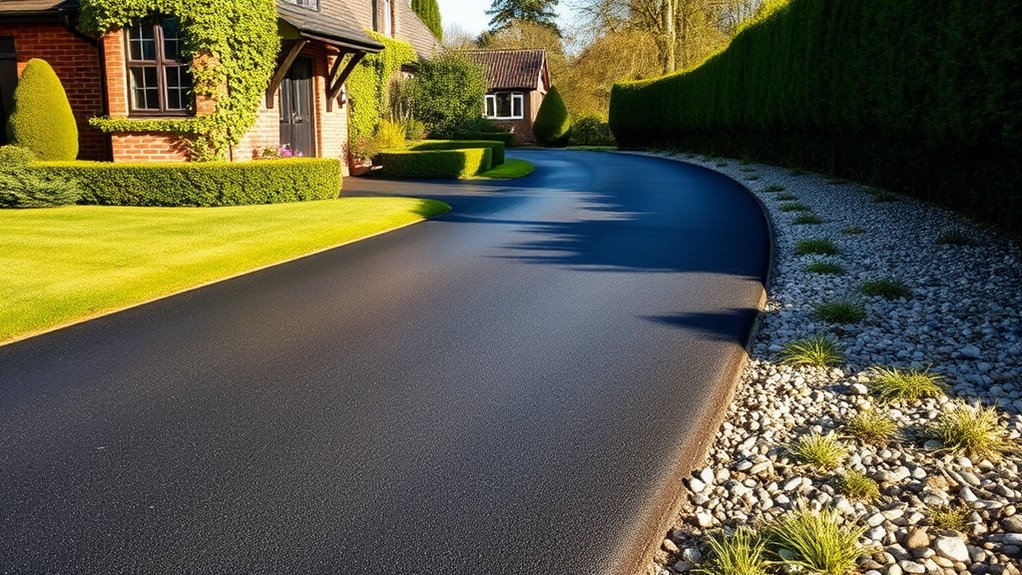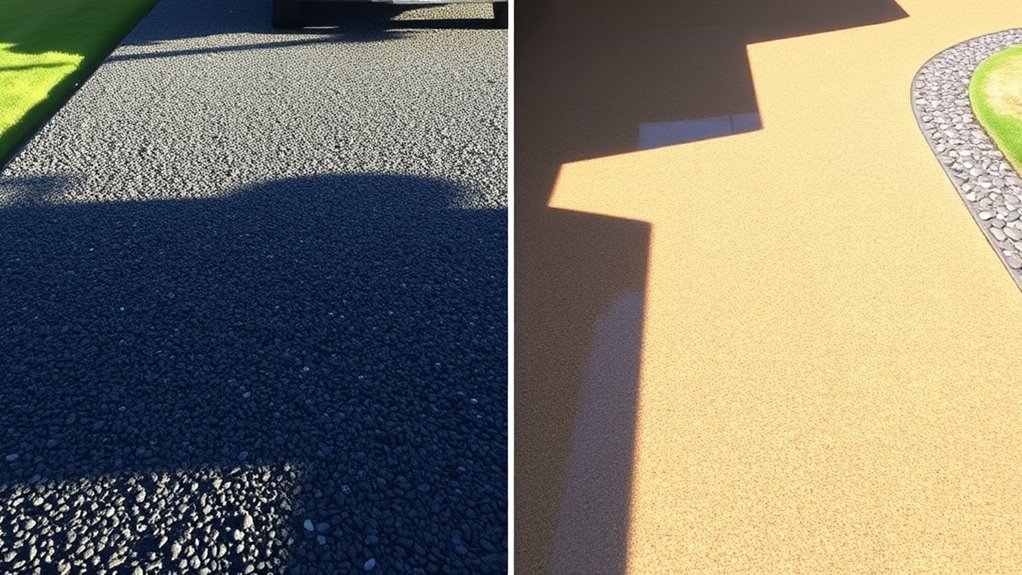A gravel driveway is an excellent option for the UK climate due to its superior drainage, which helps prevent water pooling during heavy rain. It’s generally more cost-effective than concrete or tarmac and can even be installed as a DIY project. However, it does require regular maintenance to keep it looking its best. Its natural permeability assists with surface runoff management and complies with Sustainable Drainage Systems regulations. Explore its benefits and installation further to see if it’s the right choice for you.
Table of Contents
ToggleKey Takeaways
- Gravel driveways are excellent for drainage, helping to prevent water pooling and minimise flooding during heavy rainfall in the UK.
- Being porous, gravel complies with Sustainable Drainage Systems (SuDS) regulations, which aid groundwater recharge.
- They are more affordable to install compared to concrete or tarmac, making them a cost-effective choice.
- Gravel driveways can be customised in design, boosting your home’s curb appeal and blending nicely with your garden.
- For the best results against the UK’s unpredictable weather, proper installation and regular maintenance are essential.
Suitability for Varied UK Weather
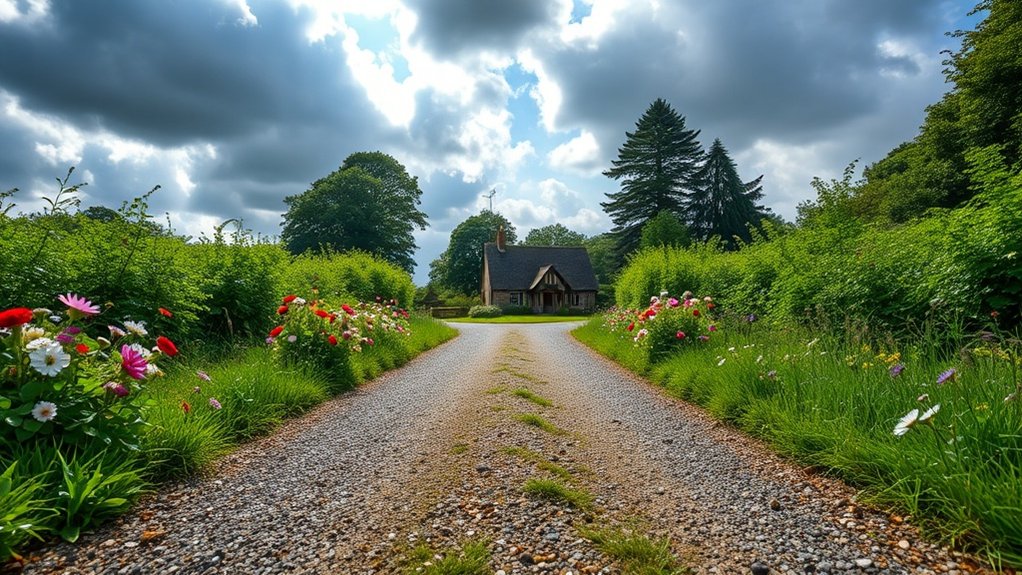
When considering a gravel driveway in the UK, it’s important to assess how it performs in our varied weather.
Gravel driveways are great for drainage, allowing rainwater to seep through and reducing puddles—crucial given our regular rainfall. Their porous design is especially beneficial in areas with heavy rain, as it helps prevent water pooling. Additionally, assessing drainage requirements can help avoid water accumulation issues that may arise. Regular maintenance, such as removing debris from the surface, can also improve drainage efficiency and longevity.
You can also create a slight slope in the driveway to direct water away from buildings, which can help minimise freeze-thaw problems during colder months.
For added durability, resin-bound gravel is an option that enhances drainage while keeping the gravel in place. However, installation matters. If drainage isn’t properly managed or the sub-base isn’t prepared correctly, it can lead to long-term issues and extra maintenance.
Cost-Effectiveness of Gravel Driveways

When considering a gravel driveway, you’ll find that the initial installation costs are significantly lower than materials like concrete or tarmac. If you choose to take a DIY approach, you can save even more, making gravel an appealing option. This affordability, along with low long-term maintenance costs, makes gravel driveways a sensible choice for homeowners. Additionally, labor costs constitute a significant portion of the total driveway expense, making it essential to factor them into your overall budget. However, it’s important to note that while gravel driveways are cost-effective, they may require periodic replenishment and maintenance, which can impact their long-term value.
Lower Initial Costs
Gravel driveways are a budget-friendly option for homeowners wanting to maximise functionality without breaking the bank.
The average cost for a double gravel driveway is around £3,000, significantly cheaper than alternatives like tarmac and concrete, which start at about £2,300 each.
The initial cost of gravel installation ranges from £1.50 to £3 per square foot, making it an appealing choice for those focused on saving money. Installation typically takes about 2 days to complete, allowing homeowners to enjoy their new driveway in a short time frame. Additionally, due to its lower costs and simpler maintenance, gravel driveways can be a practical long-term investment.
While gravel does need occasional replenishment, these maintenance costs are generally lower than resurfacing concrete or asphalt.
Therefore, despite slightly higher upkeep, gravel can lead to substantial long-term savings, making it a wise choice for your driveway.
DIY Installation Savings
With home improvement costs on the rise, a DIY gravel driveway can be a budget-friendly solution.
Installing a gravel driveway is one of the easiest DIY projects, requiring just basic tools like shovels, rakes, and a wheelbarrow. By doing it yourself, you can save on professional labour costs, which typically range from £30 to £50 per square metre. Materials usually cost around £30 per square metre, so the savings can really add up.
There are plenty of online guides and video tutorials to help you learn the installation process. While achieving a level surface and ensuring proper compaction can be tricky, the long-term maintenance costs for gravel driveways are generally lower than other types, making your DIY effort a worthwhile investment.
Easy Installation Process
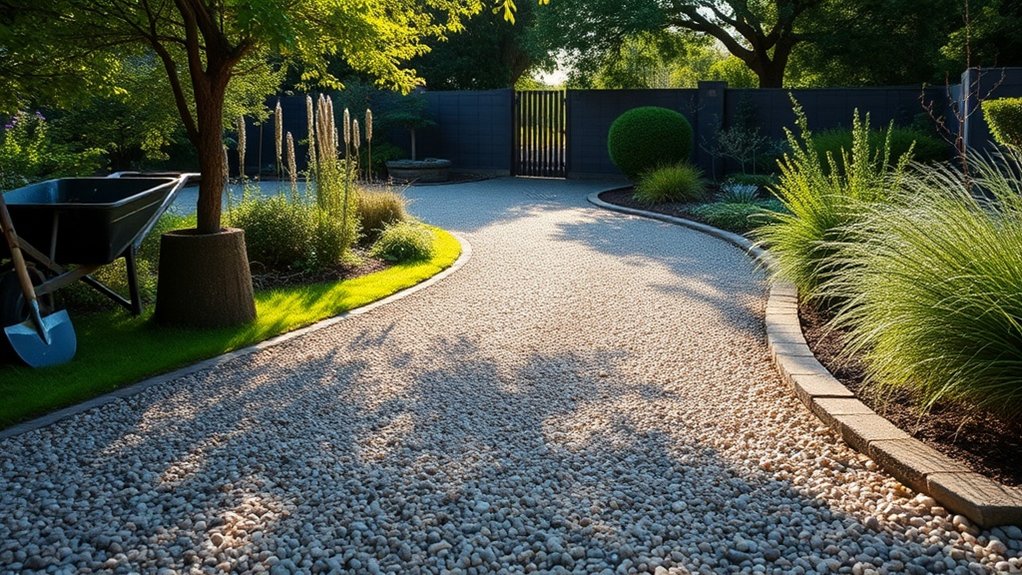
For a successful gravel driveway installation, follow these straightforward steps.
Start by excavating the area to a depth of 150mm to 300mm, depending on your soil type and how you plan to use the driveway. Remove any turf, topsoil, or existing surfacing, and clear the site of rocks and debris to ensure a level base.
Next, create a solid sub-base using compacted crushed stone or MOT gravel, typically 100mm to 200mm deep.
Lay down a geotextile membrane to improve drainage, then apply a permeable weed membrane to prevent unwanted growth.
Finally, install gravel grids for extra stability before filling them with gravel to the recommended depth.
This method makes the installation process easier and enhances the durability of your driveway, making it a smart choice for your home.
Maintenance Considerations

Once your gravel driveway is installed, regular maintenance is crucial for maintaining its functionality and appearance. Aim to grade and top up the gravel every 1–2 years, particularly after heavy rain or snow to prevent ruts and shifting.
Using weed control methods like barriers or fabric can significantly reduce maintenance efforts. Regular weeding or applying herbicides can keep stubborn weeds at bay, stopping them from displacing stones and causing an uneven surface.
It’s also advisable to conduct an annual inspection for signs of erosion or displacement, ensuring your driveway stays stable and looks good.
With proper care, you can expect your gravel driveway to last between 10 to 20 years.
Environmental Advantages
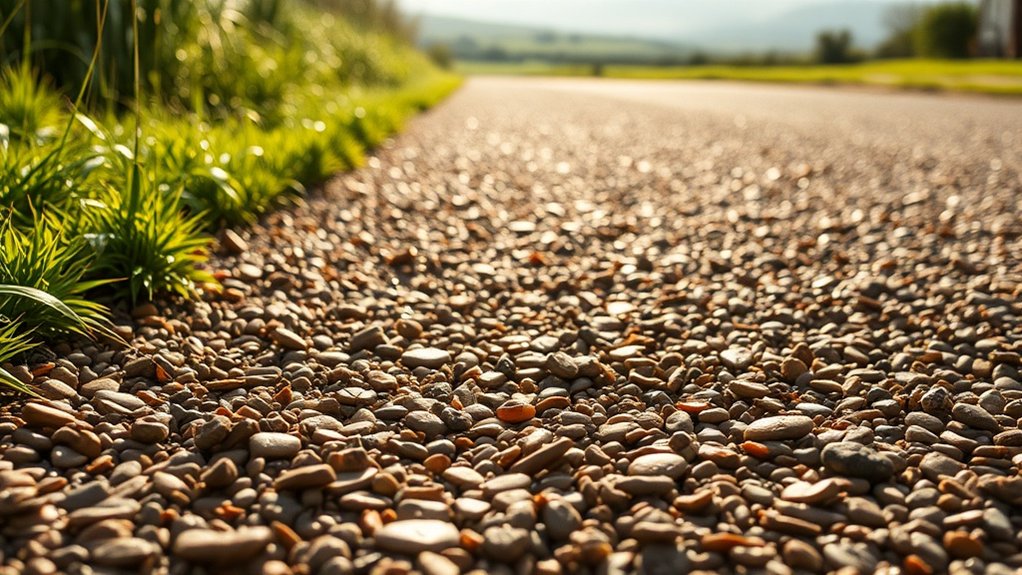
Choosing a gravel driveway has several environmental benefits.
Its permeability allows rainwater to drain efficiently, reducing surface runoff and supporting groundwater recharge. This helps to minimise the risk of flooding during heavy rainfall.
Permeability Benefits
As urban areas grow, effective stormwater management is essential, and permeable driveways offer notable environmental benefits.
Using permeable materials, gravel driveways allow water to seep through the surface, which reduces surface runoff and helps delay flooding. This feature is crucial for tackling urban flooding and aids in recharging groundwater, which is vital for local ecosystems.
Furthermore, gravel driveways meet Sustainable Drainage Systems (SuDS) regulations, managing runoff on-site and protecting nearby waterways from pollution.
They also help combat the urban heat island effect by promoting evaporation and cooling the surrounding area.
Investing in a permeable driveway not only enhances your property but also supports environmental sustainability and community resilience.
Natural Material Advantage
Building on the environmental benefits of permeable driveways, using natural materials like gravel offers several advantages for sustainability.
Gravel is a naturally occurring material that requires much less energy to extract than synthetic alternatives. It doesn’t need chemical treatments or sealants, which helps reduce harmful substances released into the environment.
Sourcing gravel locally cuts down on transportation emissions and supports local economies, fostering ecological balance. Moreover, gravel is recyclable, meaning less landfill waste when it reaches the end of its life.
With plenty of gravel available in the UK and sustainable quarrying practices in place, gravel driveways positively contribute to climate change mitigation, responsibly using resources while preserving our natural landscapes and biodiversity.
Reduced Surface Runoff
Many driveways contribute to surface runoff issues, but gravel driveways provide a sustainable solution that tackles this concern effectively.
Here are three key benefits of choosing gravel:
- Natural Drainage: Gravel allows rainwater to seep through, reducing puddles and helping to replenish groundwater.
- Regulatory Compliance: Gravel driveways meet UK Sustainable Drainage Systems (SuDS) regulations by guiding water to permeable areas instead of hard surfaces.
- Flood Risk Reduction: Gravel significantly decreases runoff volumes, lowering the chances of local flooding and reducing pressure on drainage systems.
Choosing a gravel driveway not only addresses runoff problems but also supports environmentally friendly practices, benefiting your property and the wider community.
Durability and Performance in Harsh Conditions
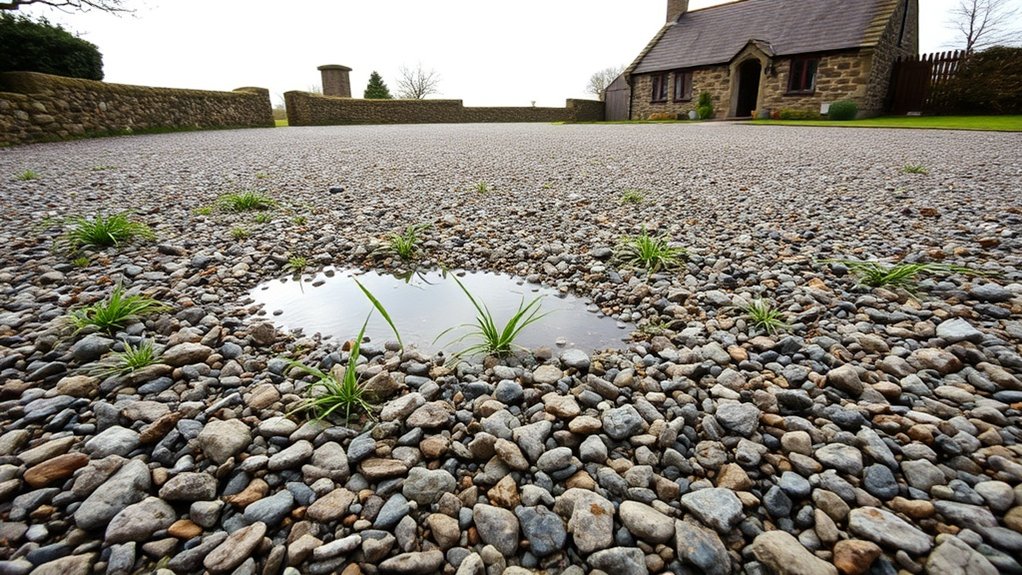
The unpredictable UK weather can put gravel driveways to the test. Regular rainfall often causes gravel to shift, leading to uneven surfaces that need topping up.
Furthermore, freeze-thaw cycles can damage gravel if water seeps into it and the sub-base, resulting in cracks. Using well-compacted materials like crushed concrete can improve resistance to these freeze-thaw effects.
However, in summer, high temperatures can dry out the gravel, increasing maintenance needs. For optimal performance, consider moisture-resistant options like lava rock or slate chips.
While gravel provides good drainage, it’s important to manage erosion and upkeep to keep your driveway functional and attractive in tough conditions.
Design Flexibility and Aesthetic Appeal
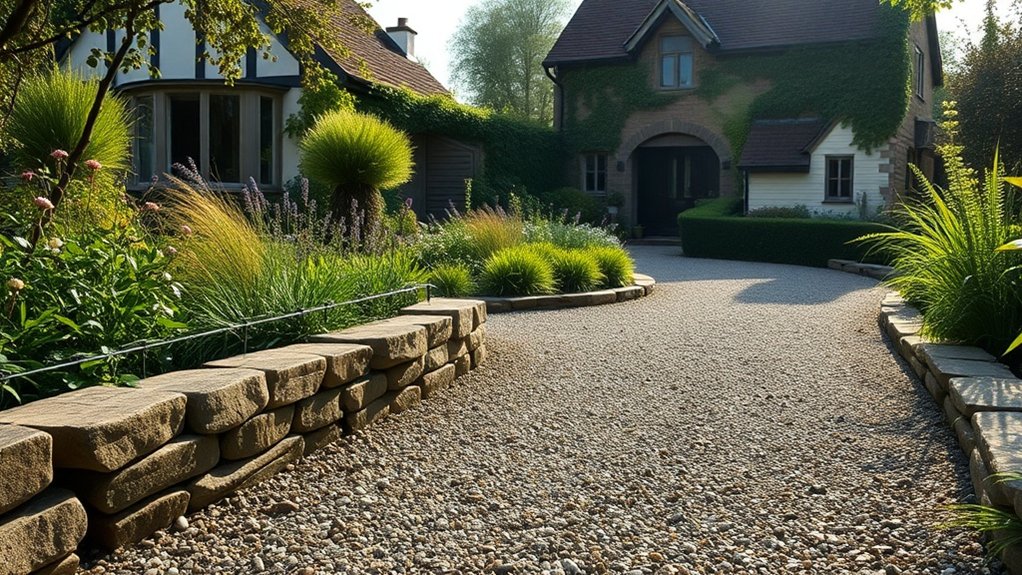
Choosing a gravel driveway brings a host of design flexibility and aesthetic appeal that can elevate the charm of your property.
Gravel driveways provide various design options, allowing for a distinctive look. Here are three key benefits:
- Customisation: Combine different types, colours, and textures of gravel to match your personal style.
- Layouts: Choose from curved, straight, or geometric patterns to suit the shape of your property.
- Integration: Effortlessly blend your driveway with landscaping features like trees and borders for a unified appearance.
This adaptability not only enhances visual interest but also boosts your curb appeal.
With regular maintenance, your gravel driveway can remain tidy and attractive, making it a worthwhile investment for your home.
Drainage Benefits in Heavy Rainfall

A gravel driveway provides excellent drainage benefits, especially in areas that experience heavy rainfall, making it a smart choice for UK homeowners.
The natural permeability of gravel allows rainwater to pass through, improving drainage and reducing surface runoff during heavy downpours. This means less water collects on the surface, helping to avoid the pooling problems often seen with solid driveways.
Gravel driveways also assist in replenishing groundwater and lowering flooding risks by directing water away from your property.
By following sustainable drainage systems (SuDS) regulations, they meet environmental standards, making them an eco-friendly option.
With proper installation and maintenance, you can ensure your driveway remains accessible and functional throughout the year, even during heavy rain.
Planning Permissions and Regulations
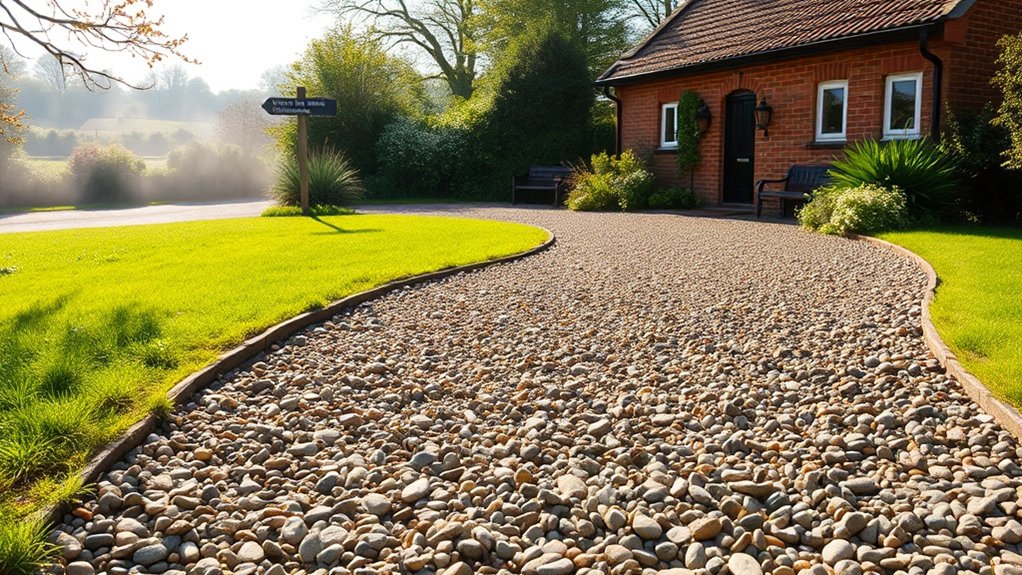
Understanding planning permissions and regulations for gravel driveways is crucial for homeowners in the UK. Here are some key points to consider:
- Planning Permission: Generally, you won’t need planning permission for permeable gravel driveways that are less than 5 square metres. However, if you’re using non-permeable surfaces, you’ll need to apply for permission.
- Consult Your Local Authority: Always check with your local planning authority (LPA) to ensure you comply with any specific regulations or restrictions that could impact your driveway project.
- Access Points: If you’re altering or creating a new access point onto a public road, you’ll typically need planning permission, regardless of the materials used.
Frequently Asked Questions
How Does Gravel Affect Property Drainage During Heavy Rainfall?
Gravel improves property drainage during heavy rain by allowing water to seep through and flow away efficiently. Its porous structure helps prevent water from pooling, but this is only effective if the base layer and slope are properly built and maintained. For example, a gravel driveway can quickly drain rainwater, reducing the risk of flooding in your garden or home.
Can Gravel Driveways Support Heavy Vehicles Without Damage?
Gravel driveways can support heavy vehicles, provided you ensure proper compaction and account for the vehicle’s weight. A strong base and regular maintenance are key to preventing issues like ruts or displacement. For example, if you regularly park a large van or SUV on your driveway, make sure the gravel is well compacted to withstand that pressure.
Are There Specific Gravel Types Best Suited for UK Climates?
For UK climates, crushed stone and red granite are ideal gravel types because of their durability and resistance to weather. They handle heavy rain well, providing effective drainage and requiring minimal maintenance—perfect for driveways.
How Often Should Gravel Be Topped up or Replaced?
You should top up your gravel every one to three years to ensure it lasts longer. Regular maintenance helps prevent ruts and erosion, extending the life of your driveway and keeping it looking good, especially with the UK’s unpredictable weather.
What Are the Best Practices for Snow Removal on Gravel Driveways?
For effective snow removal on gravel driveways, use plastic shovels to avoid damaging the surface. It’s best to leave a thin layer of snow for insulation. Regularly check for erosion and address any issues. To maintain your gravel driveway, compact the stones and ensure proper drainage to prevent damage during winter.
Conclusion
Choosing a gravel driveway for your property can be a practical option, especially given the UK’s changeable weather. Imagine a gravel path that not only looks attractive but also helps manage rainwater effectively. While it does require some upkeep, gravel is cost-effective and offers a range of design possibilities. Its natural drainage helps prevent flooding, ensuring your driveway remains functional and appealing for years to come.
How can a tarmac driveway enhance your home's appeal? Discover the key aspects of cost, installation, and maintenance in our Read more
Wondering if a tarmac driveway is the perfect fit for your home? Uncover the essential pros and cons before making Read more
Choosing between a tarmac and resin driveway can be challenging; discover the key factors that could influence your decision.

